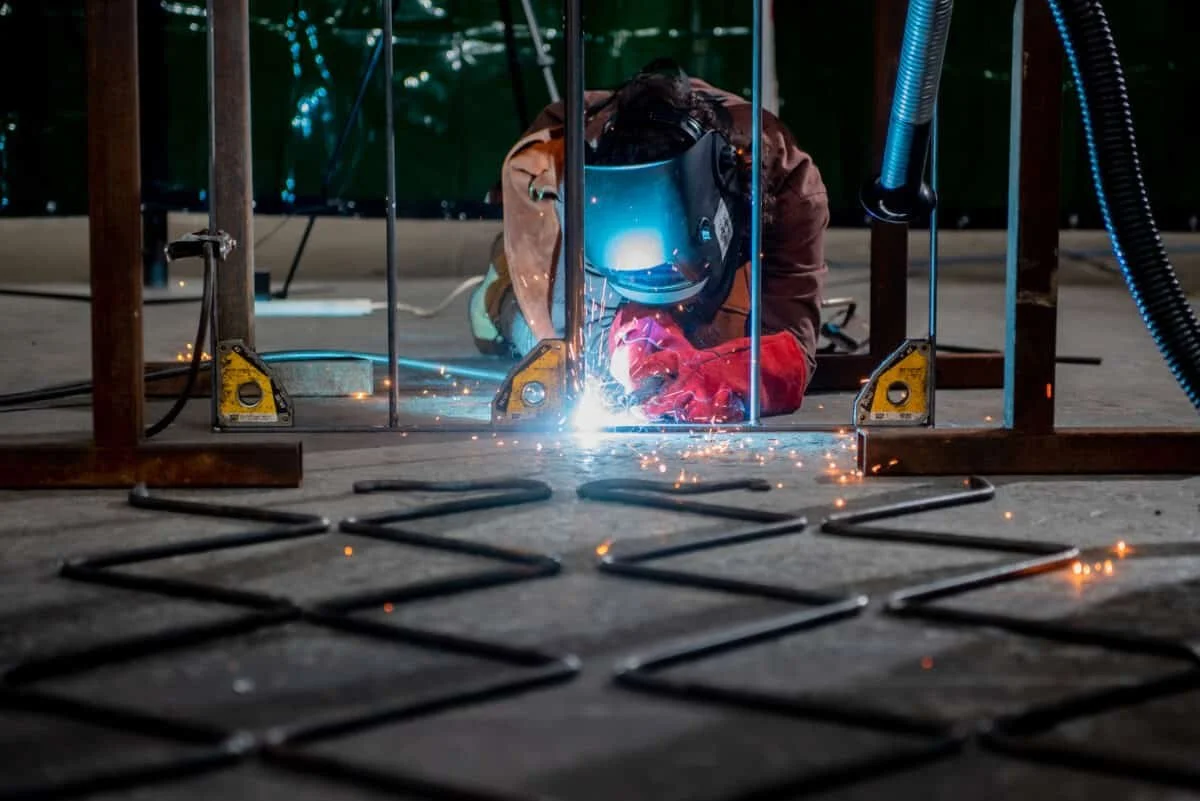Rachel Mars: FORGE
The Barbican
-
The Barbican -
Emblazoned with the infamous ‘Arbeit Macht Frei’, or ‘Work Will Set You Free’, the original gate of Dachau concentration camp was stolen in 2014 before being found in Norway two years later. A replica gate was forged to replace the stolen one, and in FORGE, artist Rachel Mars spends four days forging her own replica.
It is durational, each visitor to the installation books a slot, walks through a tunnel adorned with pink curtains and information on Jewish rituals and the Holocaust, is given a welding helmet to wear and ushered into a large room where Mars is forging her gate. I went at the start, one of the first to go through, and saw, through the restricted lens of my welding mask, Mars meticulously sanding down metal to fit across her gate’s fundamental structure.
There is a live soundtrack to go with it, created by Sound Designer Dinah Mullen, which picks from a library of archival recordings, compositions, found sounds and music; including a number of ‘monumental silences’ from around the world.
I have really struggled to put this piece into words, let alone into a review. As described it sounds small, spending time watching someone weld, over the course of four days, could be excruciatingly mundane. But as you watch Mars in that room, behind that mask, with sparks occasionally flying, magnets occasionally dropping, visors occasionally lifting, small is the last word you’d use to describe the feeling that pervades the room. It is a deeply intricate work, layered with meaning that envelops you as you sit, or stand, watching from behind safety gear.
The choice of pink curtains is explained in an accompanying pamphlet, which includes various pieces of writing - interviews, ideas, graphics -, by an email from Austrian Artist and Anti-Monument Designer Eduard Freudmann in which he states:
‘In the past 20 years pink has been used as a colour to substitute red in anti fascist activism, in logos, flyers and such. It is an attempt to queer this very militaristic red that used to be employed.’
The queering of fascist symbols is a fascinating element to this installation, the juxtaposition of joyous queer anthems, that occasionally burst forth during my stay, with images associated with the Holocaust give this performance an unsettling power and I found myself spending over an hour with the work quite easily.
In the same pamphlet, psychologist Dina Wardi is attributed to suggesting the notion that
‘following the Holocaust, one person in each generation of a survivors’ family is unofficially and unconsciously designated as the holder of memory of their murdered relatives. This person becomes an unconsenting ‘memorial candle’; a light-bearer for their memories.’
It is a beautiful idea, and as Mars’ sparks fly, I am reminded of the twenty-four of her relatives that were murdered across Europe at concentration camps. Mars is the light-bearer for their memories, FORGE could be seen as the ritual that embodies that quote, with Mars not only creating a space for reflection but also exploring the ethics of preserving sites of collective trauma for visitors.
This is an incredibly interesting idea. I was on holiday in Krakow in January and spent a day at Auschwitz, it was an overwhelmingly emotional experience and the gap between learning about the Holocaust and standing where it happened is immense, however I was stunned by the touristification of the site - with cafes, giftshops, a restaurant and hotel across the road. Mars wrote a wonderful piece of writing that interrogates the unease felt at making an experience of these sites. A copy in full can be found at the bottom of this page and I would encourage everyone to read it, but the final section is about the decision to include a gift shop at the site of a former camp: ‘And a shop. At the way out. People want to take something away with them.’ Then the final sentence, apropos of guide books in shops at concentration camps, Mars writes that ‘People will buy them and look at them later and think it happened there and it’s stopped happening, thank God.’
Auschwitz also lost its original ‘Arbeit Macht Frei’ sign, stolen in 2009 by the Swedish neo-Nazi Anders Högström - he was someone who wanted ‘to take something away with them’ but he was not looking back and thinking ‘it’s stopped happening, thank God.’ The Holocaust may never happen again, but ideologies that feed off the othering of human beings, of stoking fear and hatred, are alive and well.
It is, of course, important to remember, and rituals give us a unique way to do that. FORGE is a ritual, one pulsing with resilient love - when you leave the space you are encouraged to wash your hands three times from a cup. I am not religious, or even particularly spiritual, but placing remembrance into actions, into physical movements, into the body is beautiful.
FORGE was on at the Barbican between the 17th - 20th May. See more of their programme here.
FIVE STARS
Photo by JMA Photography
